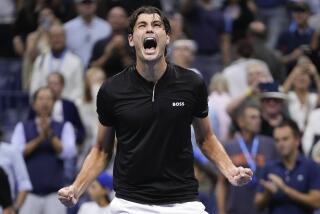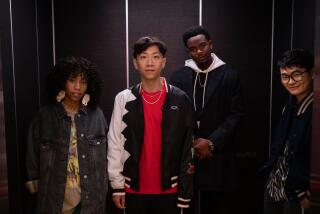Chang Unable to Make Headway in Rafter’s Wake
- Share via
NEW YORK — Michael Chang’s date with destiny has been one of the most postponed engagements in recent Grand Slam history.
Talented beyond his limited physical gifts, Chang has crafted a remarkable career driven by perseverance and finesse. Alas that the sport in which he toils is currently fueled by sonic serving and points that last for mere seconds.
The sureness of his movement through a Grand Slam tournament draw is almost always matched by the inevitability of his eventual failure to gain the title. Patrick Rafter’s 6-3, 6-3, 6-4 dismissal of Chang in Saturday’s U.S. Open semifinal only completes the dull scenario.
“It’s almost as if somebody’s teasing you with something, giving you a piece of candy,” said Chang, who twice has been runner-up here. “You go like this [reaching out with his hand]. They take it away.
“I feel like if there’s a word to characterize my career and my life, it’s perseverance. I’m not one to quit. I’ll continue to work at it. You have to have heartbreaks, times where you fail. You have to pick yourself back up, and try, try again.”
Rafter will play unseeded Greg Rusedski of Britain in today’s final at Arthur Ashe Stadium. Rusedski defeated Jonas Bjorkman of Sweden, 6-1, 3-6, 3-6, 6-3, 7-5.
Rafter has won two of the three meetings with Rusedski.
Chang has had ample time to dwell on the expectations placed on him since the departure of Pete Sampras in the fourth round. After his loss, Sampras offered Chang and Andre Agassi as his picks to win.
Agassi promptly lost in the same round, leaving Chang as the only American available to win his national championship.
Chang has said many times he doesn’t need to win another Grand Slam tournament to validate his 1989 French Open title. His career, he said, has been built on consistent excellence rather than one or two spectacular but winning anomalies.
The 25-year-old has a career winning percentage of 73.5%, a record surpassed by only one or two active players.
Still, to many in tennis, the measure of a career is taken in Grand Slam titles.
Even in his moment of triumph, Rafter was not unmoved by the futility of Chang’s lot. Nor by the fact that, in his moment of supreme disappointment, Chang was thoughtful enough to give Rafter encouragement about today’s final.
“At the end of it, as I exited . . . I felt--you sort of have to feel something for the other person, and I did,” Rafter said. “He was very, very supportive. You know, he was a fantastic sportsman at the end of the match. It’s just so nice to see that.”
Still, Rafter, 24, was able to bask in the happy thought that he has made it to his first Grand Slam tournament final. His good-natured joy meshed with his frank view of the high level of his play.
“It’s hard for me to do a lot wrong,” Rafter said. “Everything seems to be falling into place for no particular reason. I’m just enjoying it while it’s there.”
Chang came into the match having played back-to-back five-setters, a trademark of his. But Chang is also known as one of the most fit players on the tour, so he began Saturday’s match with no ill effects from the two weeks of tennis.
The first two sets flew past and Chang was having more and more difficulty trying to break Rafter, who was serving and volleying in a retro style seldom seen since the retirement of Stefan Edberg. Rafter was successful on 82% of his first serves and even Chang’s vaunted return did not penetrate that wall.
Chang had eight break points in the match and failed to convert any.
Alone among players on the tour, Chang can find comfort in being down two sets to love. He has come back in such a situation six times in his career, four of those times at Grand Slam tournaments.
But his effort in the third set was just as negligible against Rafter’s net dominance. Chang stood in against the serving barrage and maintained he never, ever gave in to dark thoughts. To Chang, the notion that he would give up is repugnant.
“Two sets to love down, I knew it would be tough but not impossible,” Chang said. “Why give up? Semifinals of the U.S. Open. Why would I do that?”
More to Read
Go beyond the scoreboard
Get the latest on L.A.'s teams in the daily Sports Report newsletter.
You may occasionally receive promotional content from the Los Angeles Times.











